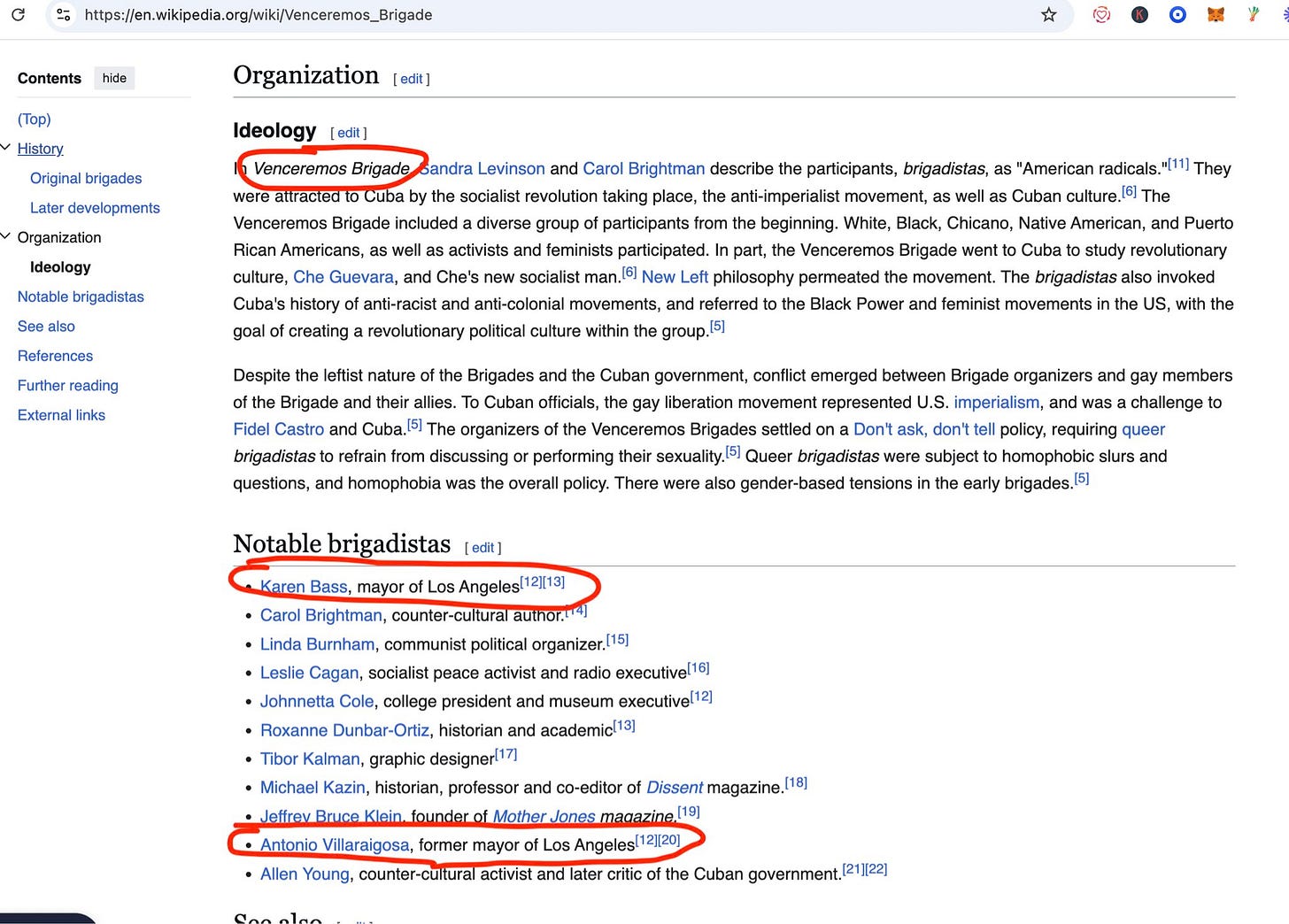Karen Bass: Venceremos Brigade Ties, Communist Allegations, and Leadership Critiques
Karen Bass’s political career, much like the policies she champions, is a mixed bag of lofty rhetoric and deeply troubling realities. Her past involvement with the Venceremos Brigade in the 1970s is not just a footnote—it’s a glaring red flag that raises serious questions about her judgment, values, and what she truly stands for. While Bass projects herself as a progressive leader, her record suggests an affinity for ideologies that are fundamentally at odds with the principles that have made America free and prosperous.
The Venceremos Brigade
The Venceremos Brigade was more than just a group of idealistic young people traveling to Cuba; it was a calculated tool of Fidel Castro’s regime. Participants worked on Cuban farms and construction projects, symbolically endorsing a regime notorious for its oppression, censorship, and political imprisonment. For those who went, it was not just an experience—it was an allegiance.
Karen Bass’s involvement with this group reveals a disturbing lack of discernment. While she’s tried to frame her trips as educational, focusing on Cuba’s healthcare and education systems, this explanation conveniently glosses over the brutal realities of Castro’s dictatorship. Admiring a regime that suppresses dissent, imprisons critics, and stifles basic freedoms speaks volumes about her worldview.
Allegations of Communist Sympathies
Bass’s association with the Venceremos Brigade isn’t just a youthful indiscretion; it’s a deliberate decision that reveals a deeper ideological alignment. Critics argue that her actions weren’t about curiosity or education—they were about embracing a worldview that runs counter to the principles of freedom and individual rights.
Historical Context
Let’s not sugarcoat it: during the Cold War, any affiliation with a group like the Venceremos Brigade was a clear indication of where someone’s loyalties lay. The Brigade was not shy about its support for Castro’s regime. For Karen Bass to align herself with such an organization shows, at best, a lack of critical thinking and, at worst, an affinity for a dangerous ideology.
Karen Bass’s Response
Bass has repeatedly tried to downplay her involvement, portraying it as a youthful adventure. But actions have consequences, and character is revealed by choices. Her attempts to reframe the narrative as one of innocent exploration fail to address the glaring issue: why align yourself with a regime that embodies the antithesis of the freedom you claim to support?
Political Impact and Public Perception
As Mayor of Los Angeles, Bass’s controversial past is not just a distant memory; it informs her leadership today. Her critics argue that the same misguided ideology she embraced in her youth continues to influence her approach to governance. With Los Angeles facing crises ranging from homelessness to wildfires, Bass’s leadership has drawn scrutiny—and not without reason.
Criticism
Her handling of the city’s pressing issues has left many questioning her priorities. Critics argue that she prioritizes ideological agendas over practical solutions, often to the detriment of the very people she claims to serve. The recent wildfires have been a case in point, with accusations that her administration’s response has been slow and ineffective—more focused on political grandstanding than actual problem-solving. Read more here.
Communist Influence in Leadership
To her detractors, Bass represents more than just poor leadership; she’s seen as a figure advancing a subtle but dangerous agenda. Her past with the Venceremos Brigade and her present policies are viewed as part of a broader effort to undermine American values. Whether intentional or not, the result is the same: weakened institutions and declining trust in leadership.
Last Word
Karen Bass’s story is not one of redemption or growth; it’s one of consistency—a troubling consistency that reveals a willingness to align with authoritarian ideologies. Her past involvement with the Venceremos Brigade is not an isolated incident; it’s a reflection of a worldview that prioritizes centralized control over individual freedom. As Mayor of Los Angeles, her leadership has done little to dispel these concerns. If anything, her handling of issues like homelessness and wildfires has reinforced the notion that she’s more interested in ideology than results. For a city in desperate need of effective leadership, that is a sobering reality.


